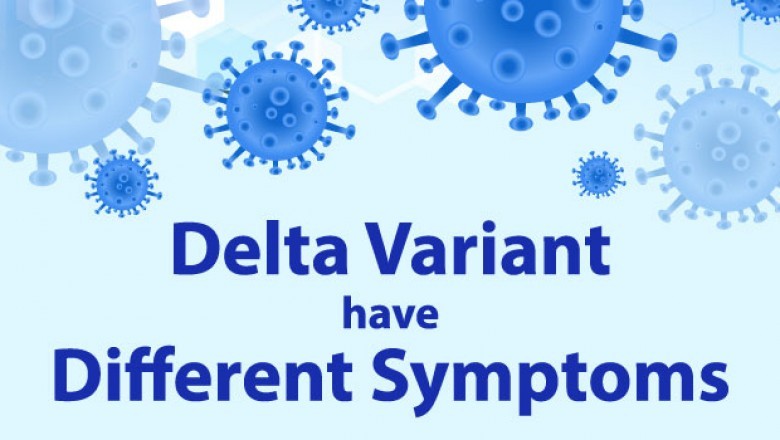views

For more than 18 months now, we have been living in a coronavirus world. Emerging data suggest people infected with the Delta variant, the variant behind the second wave in India, have symptoms different to those we generally associated with COVID earlier in the pandemic.
Not only did the Delta variant of COVID-19 cause a massive toll on our lives but also deprived us of our mental health. According to experts, as the virus has evolved, the most common symptoms seem to have changed too. The Delta and Delta plus (mutation of the Delta variant) variants have evolved enormously and posed more risk to our life. Moreover, the symptoms experienced from the Delta variant may also differ from that of the original COVID-19.
Delta Variant of Coronavirus
It is a matter of concern that health experts caution that the delta variant of COVID-19 relatively takes much less time to make someone sick and the symptoms flare within a comparatively shorter time span. The Delta variant is more deadly than the original one. Besides causing everything from the usually benign common cold to far more serious respiratory conditions such as SARS and MERS, the symptoms of this new virus variant are somewhat different when it comes to symptoms of the highly contagious Covid-19 delta variant.
Does the Delta Variant have Different Symptoms?
Yes. The Delta variant has different symptoms.
As per the Centers for Disease Control and Prevention (CDC), the common symptoms of COVID-19 as noticed during the beginning of the pandemic include:
- Chills of fever
- Shortness of breath
- Difficulty breathing,
- Cough, Fatigue
- Muscle or body aches
- Headache or Loss of taste or smell
- Sore throat, Congestion or runny nose
- Vomiting or nausea
- Diarrhea
However, when it comes to the Delta variant, it has tightened its grip across many states in India. And it can cause health issues such as shortness of breath, cough, fever, congestion and body aches. It may be that you will not get the loss of taste and smell. Doctors advise you to get tested if you have any of these symptoms.
- The Delta variant is more contagious in comparison to other SARS-CoV-2 virus strains
- Research has revealed that the Delta variant spreads more easily between individuals
- People transmit the new strain of COVID-19 to others sooner than people spread the original strain of coronavirus
- This new variant spreads more efficiently makes the Delta variant worrisome
- The CDC has classified the Delta variant of COVID-19 as a “variant of concern”
- It’s a term, which is used when a virus is more transmissible, causes more severe disease or involves other complications.
Remember that people who were unvaccinated and infected with the Delta variant are found to have a viral load within their respiratory systems. This viral load was thousands of times higher when compared with the amount of virus that was available among people who had been infected by the original strain of coronavirus. The combination of a higher viral load spreads the virus to others sooner (when people may not realize their sickness).
Moreover, a person infected with the Delta variant can get sicker. Reports have said that unvaccinated people infected with the COVID-19 Delta variant are twice as likely to be hospitalized, due to severity of illness, than people who are infected with the Alpha variant of COVID-19, which had early been considered more contagious if compared with the original strain of the COVID-19.
Why Symptoms of Delta Variant Different
Virus infection depends on two factors.
- One is related to the viral factors – If involves the speed of the replication, the rate of infection, mode of transmission and more. It alters with the virus mutation.
- Other factors involve age, medications, gender, diet, health exercise, and stress.
It is therefore important to collect ample data from individuals to ascertain the most common out of the many when it comes to signs and symptoms of a particular virus. Because the Delta variant is a mutation of the original COVID-19 strain, it is said that the symptoms may also have changed during the course of the mutation.
The data collected on the symptoms suggests that while cough, fever, headache and sore throat remain to be common coronavirus symptoms, a runny nose was hardly found in reports in the earlier data. Further, loss of sense of smell was originally quite common but now is the ninth most common symptom.
Vaccine Efficacy
There has been a lot of buzz around whether or not the COVID vaccines are effective against the Delta variant. Many studies have claimed that certain vaccines are effective against the Delta. Covaxin, Covishield and Sputnik V being given in India are all said to be effective against the Delta variant. In addition to this, the Pfizer BioNTech vaccine also reduces the risk of hospitalization.
The Indian Council of Medical Research (ICMR) recommends that people who aren’t vaccinated should get the COVID-19 vaccine as soon as possible to safeguard them from the Delta variant and the original COVID-19. The vaccines protect against the severity of illness, thereby preventing hospitalization and death.
During the second wave in India, hospitals witnessed admissions of mostly younger and unvaccinated patients. Experts are of the view that the changes in symptoms might be a result of vaccination drives. While older people have gotten the vaccines, the younger people add to the majority of coronavirus cases and they are more likely to contract mild infections.
Conclusion
While experts are researching to ascertain the 100% effectiveness of the COVID vaccines, it is crucial to get completely vaccinated in time and at all costs. Vaccine surely reduces the symptoms of original strain as well as the Delta variant, keeping you out of the hospital and alive. If you have any questions related to COVID-19, Delta variant or vaccines, meet your physician.
Other effective ways to stay protected against the Delta variant include wearing a mask over your nose and mouth while spending time with people from other households, staying 6 feet away from them, practicing frequent hand washing (or using hand sanitizer when water and soap are not available and steering clear of crowded indoor spaces. Furthermore, pay attention to local COVID-19 infection rates, including Delta variant rates. And avoid unnecessary social gatherings.












